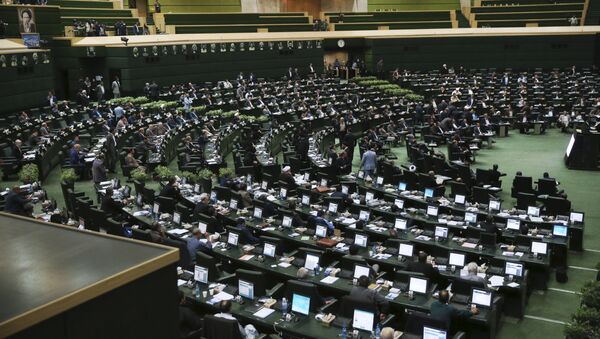Iran’s legislative body on Monday unanimously approved a bill barring any cooperation with Israel, reported Fars new agency.
According to the document, unanimously approved by all Iranian legislators present in an open parliament session, any use of Israeli computer hardware or software in Iran is forbidden, while cooperation or spying for the “Zionist regime” is equal to “enmity towards God and corruption on earth”.
The new bill also bans transferring Israeli-produced goods across Iranian territories, as well as participation of Israeli nationals and firms in the exhibitions held in the country.
Approval of the plan on 18 May followed Saturday’s elaboration of the bill on “confronting the hostile acts of the Zionist regime against peace and security”.
“Based on the first article of the bill, all Iranian bodies are required to use the country’s regional and international capacities to confront the Zionist regime’s measures, specially its warmongering and terrorist moves, siege (of Gaza), settlement construction, displacing the Palestinian people and occupation of countries’ lands, including Golan,” the agency cites spokesperson of the parliament's commission on national security and foreign policy, Seyed Hossein Naqavi Hosseini as saying.
The bill, according to the politician, also voices support for Quds city as the Palestinian capital, and urges the establishment of the Islamic Republic of Iran’s virtual embassy or consulate (in Palestine),” Fars reported.
Addressing an open session of the parliament in Tehran on Monday, Iranian Parliament Speaker Ali Larijani praised the document as “very timely”, saying:
“Approval of the bill to confront the hostile acts of the Zionist regime against peace and security is highly important in confrontation against the regime’s hostile measures to disturb the regional situation.”
There has been no clarification as to how the bill’s provisions would be implemented.

The legislation was approved on the eve of the International Quds Day on 22 May, officially called International Quds Day. The annual event is held on the last Friday of Ramadan, and was initiated by the Islamic Republic of Iran in 1979 as a display of support for the Palestinians and to oppose “Zionism and Israel”.
Earlier, on 16 May, Iran’s President Hassan Rouhani allowed residents of low-risk COVID-19 regions to attend Friday prayers including Quds Day commemorations.

“Two decisions have been made for the Quds Day; first is that Quds Day will be held in 218 cities which are white cities [considered to be at low risk of an outbreak] not in the form of rallies but by presence at Friday prayers, respecting all hygiene protocols,” Rouhani was cited as telling a meeting of the national coronavirus taskforce.


